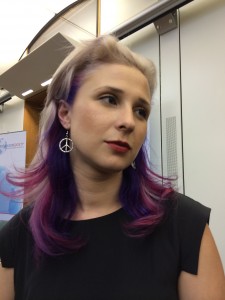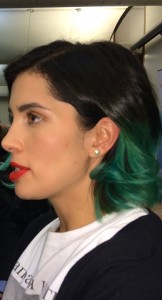

Masha Alyokhina and Nadia Tolokonnikova
The Russian feminists “PussyRiot” think the situation in Putin’s Empire has become too serious for funny songs.
Masha Alyokhina, 26, and Nadia Tolokonnikova, 25 are the most famous members of the Russian feminist anarchist art group PussyRiot. They performed a punk prayer in a Christian Orthodox Cathedral in Moscow in February 2012 – less then a minute. They were jailed for almost two years. Since their release from prison colonies the women founded a charity called “Zona Prava” (“Zone of Right”), they fight for the rights of prisoners. PussyRiot today belongs to the most important voices of the Russian opposition against president Vladimir Putin. Last week I met them in the British Parliament where they join a commemoration for the Russian lawyer Sergei Magnitzky, who was killed in a Russian prison five years ago.
profil: Are you still PussyRiot? You seem to have exchanged your coloured balaclavas for bright hair colours.
Masha Alyokhina: We are Pussy Riot when we do performances. Then the Balaclavas come out. When we speak at an event, we are Masha Alyokhina and Nadia Tolokonnikova. Our last action as PussyRiot we did in Sochi during the Olympic Games. Our video from this performance had a very strong message: Who are these barbarians who beat women artists with horse whips? But soon afterwards president Putin annexed Crimea and sent troops to fight in Eastern Ukraine. It is extremely distressing what is happening there. So much fighting and suffering. People are dying. This war in the Ukraine is so wrong. We felt funny songs are maybe not the right reaction to it. It is time for a different political protest and something else than our punk prayers.
Profil: Will the opposition go back to the street and fight Putin openly this winter when the sanctions begin to bite? So far the president seems to be extremely popular.
Alyokhina: I don’t think there will be a revolution soon. But the question is not whether we go to the streets or not. It is a question if people want to listen to what is going on around them or not. If people are ready to put down their ear muffs and hear what goes really on around them, then there will be change. If the Russian people do not want to listen, there is nothing we can do and there will not be a change in political leadership. But we are doing as much as we can to make people listen.
Profil: Pussy Riot has been extremely unpopular in Russia – the vast majority of the population thought you were blasphemic and “unwomanly”. Since your release from prison a year ago you have strongly engaged in the fight for better conditions for prisoners in Russian prison colonies. Your “Zona Prava” (“Zone of Law”) is a kind of NGO – but not recognized by the authorities. Do you feel that people become more sympathetic towards your fight for more lawful behavior of the authorities since you fight for prisoners and not against the corruption of Putin and the church?
Alyokhina: We are currently trying to achieve NGO status for Zona Prava. We started writing about the prison conditions and people are clearly interested in what we write. Usually when we ask for something a lot of volunteers come and help us now. For us it is important to do this. We never had an organization like this and it is a new and challenging experience. Secondly we think now it’s a good choice and good example to be a human rights activist in Russia today. Alexej Navalny has an anti-corruption platform. Evgenia Chirikova fights for ecological issues. We fight for the rights of prisoners. I think it is important not to leave the country. We need to stay and keep our political convictions. We say: This is also our country, Mr. President! And we will fight for it.


